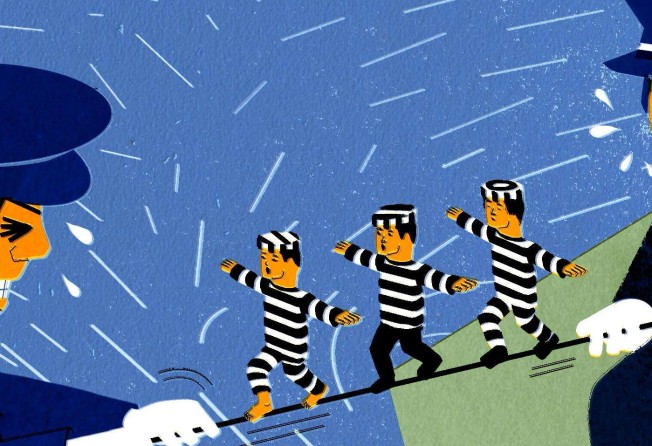
Beijing and Taipei should end their tug of war over repatriation of criminal suspects
Yu-Jie Chen and Jerome A. Cohen say China’s tighter grip will only stoke resentment, impede cross-strait peace and disrupt the cooperation in law enforcement to fight fraud, which has benefited both sides


While Tsai’s inauguration speech stated as “historical fact” that “various joint acknowledgements and understandings” had been reached in 1992 between negotiators from China and Taiwan, her carefully crafted message did not meet Beijing’s rigid demand. China has resorted to many noticeable manoeuvres since Tsai’s election: “restoring” diplomatic ties with Taiwan’s former ally Gambia; significantly reducing the number of Chinese tourist groups to Taiwan; suspending many official and semi-official cross-strait activities; and, most recently, preventing the International Civil Aviation Organisation from inviting Taiwan to this year’s conference, as the organisation did for its last conference.

Four months into her presidency, Tsai now has a clear view of the challenges of managing relations with China. Externally, she is confronted by a Beijing that rejects flexibility in dealing with the “one China” formula. Internally, she needs to meet the expectation of voters that her traditionally pro-independence Democratic Progressive Party will do a better job than the previous Kuomintang government in maintaining Taiwan’s de facto independence and safeguarding its vibrant democracy from China’s interference. Indeed, increasingly nationalistic domestic voices are seeking to assert Taiwanese sovereignty and identity at the cost of worsening contacts with an obviously impatient China.
The recent repatriation episodes in third countries substantially expand Beijing’s new suspension of cooperation with Taipei. This is a sharp departure from its practice since 2011 of collaborating with Taiwanese law enforcement. During that period, in accordance with the spirit of a groundbreaking 2009 accord – the Cross-Strait Agreement on Joint Crime-Fighting and Judicial Mutual Assistance – Chinese police worked shoulder to shoulder with Taiwanese police in third countries, not only exchanging information but also helping local law enforcement to arrest Chinese and Taiwanese suspected of colluding in telecom fraud schemes affecting both China and Taiwan. In a friendly exercise of discretion, Chinese police joined in sending Taiwanese nationals directly to the island while returning Chinese nationals to the mainland. To the great satisfaction of Taiwan’s previous president, Ma Ying-jeou, a large number of Taiwanese suspects were sent home for prosecution.

China has always claimed criminal jurisdiction over such Taiwanese suspects because the alleged fraud victimises citizens of the People’s Republic. By now resuming the exercise of that jurisdiction, Beijing can punish Taiwanese offenders more severely than they have generally been punished at home. Moreover, the cooperation of third countries in deporting Taiwanese to the mainland reminds the world of Beijing’s long-standing position that Taiwan is part of China, which is helpful to it at a time when it is building pressure on Tsai’s government to adopt the same position.
Yet, the new policy incurs important costs.
Taiwan’s law enforcement, of course, continues its efforts to influence other countries to return Taiwanese suspects to Taiwan, as recently illustrated by Indonesia’s surprising deportation of 11 Taiwanese to the island rather than China, an embarrassment to Beijing. The outcome of these behind-the-scenes struggles plainly reflects current political relations among the three parties involved and complicates Beijing’s diplomacy with third countries.
Ending the tug of war would win Beijing considerable goodwill in Taiwan
The China-Taiwan tug of war over repatriation has led to at least two other undesirable results. Although the pressures it creates on Taipei might serve Beijing’s short-term purposes, they evidently increase cross-strait tensions and further alienate people on the island, who see China’s actions as humiliating Taiwan on the international stage.
On some occasions, China’s eagerness to punish Taiwanese offenders operating in third countries has also resulted in violations of both international and domestic standards of due process of law. Most notably, when Kenya’s police in April transferred to China Taiwanese fraud suspects who had been acquitted by Kenya’s judiciary, they did so without regard to the local court’s order, which required the police to return the defendants’ passports and set them free. Instead, Kenya’s police reportedly detained the Taiwanese suspects without charge and used tear gas to force them into the custody of Chinese police who had flown from Beijing to detain them. Days after their arrival in Beijing, China resorted to its newly revived police technique – making the suspects confess their alleged crimes on state television before even prosecuting them. In August, Kenya again deported to China five Taiwanese acquitted of cyber crimes in Kenya’s court, which specifically ordered that the Taiwanese be returned to Taiwan, not China.

These developments are unfortunate not only because they burden the relations of Beijing and Taipei with other countries but, more importantly, because they inhibit building a peaceful cross-strait relationship and fostering the rule of law. On balance, China would benefit from returning to its previous repatriation policy. Ending the tug of war would win Beijing considerable goodwill in Taiwan. It would also help China’s law enforcement officers to better fight telecommunications fraud by renewing cooperation with their Taiwanese counterparts, who hold valuable information about relevant criminal networks in Taiwan.
The two sides should negotiate a formal agreement setting forth the principles for dealing with their overlapping claims regarding their nationals’ telecommunications fraud from bases in foreign countries. They would both profit from unwavering cooperation based on well-founded norms that would no longer be subject to shifting political winds.
Yu-Jie Chen, a Taiwan lawyer, has just received her doctoral degree from NYU Law School. Jerome A. Cohen, adjunct senior fellow at the Council on Foreign Relations, is professor of law at NYU and director of its US-Asia Law Institute